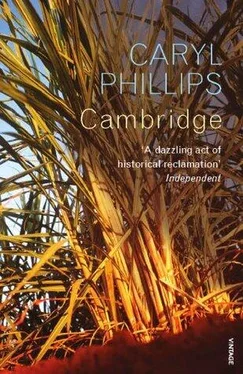Caryl Phillips - Cambridge
Здесь есть возможность читать онлайн «Caryl Phillips - Cambridge» весь текст электронной книги совершенно бесплатно (целиком полную версию без сокращений). В некоторых случаях можно слушать аудио, скачать через торрент в формате fb2 и присутствует краткое содержание. Год выпуска: 2009, Издательство: Vintage Digital, Жанр: Современная проза, на английском языке. Описание произведения, (предисловие) а так же отзывы посетителей доступны на портале библиотеки ЛибКат.
- Название:Cambridge
- Автор:
- Издательство:Vintage Digital
- Жанр:
- Год:2009
- ISBN:нет данных
- Рейтинг книги:5 / 5. Голосов: 1
-
Избранное:Добавить в избранное
- Отзывы:
-
Ваша оценка:
- 100
- 1
- 2
- 3
- 4
- 5
Cambridge: краткое содержание, описание и аннотация
Предлагаем к чтению аннотацию, описание, краткое содержание или предисловие (зависит от того, что написал сам автор книги «Cambridge»). Если вы не нашли необходимую информацию о книге — напишите в комментариях, мы постараемся отыскать её.
Cambridge — читать онлайн бесплатно полную книгу (весь текст) целиком
Ниже представлен текст книги, разбитый по страницам. Система сохранения места последней прочитанной страницы, позволяет с удобством читать онлайн бесплатно книгу «Cambridge», без необходимости каждый раз заново искать на чём Вы остановились. Поставьте закладку, и сможете в любой момент перейти на страницу, на которой закончили чтение.
Интервал:
Закладка:
Without rank and order any society, no matter how sophisticated, is doomed to admit the worst kind of anarchy. In this West Indian sphere there is amongst the white people too little attention paid to differences of class. A white skin would appear passport enough to a life of privilege, without due regard to the grade of individuals within the range of that standing. The only exception I have so far observed was the modesty displayed by the book-keeper who first conveyed me here. However, sensible to propriety, he has subsequently maintained his distance. The other men, perhaps because I am a woman, have shown little courtesy in affording the attentions proper to my rank. They converse with me as freely and as openly as they wish. This is barely tolerable amongst the whites, but when I find the blacks hereabouts behaving in the same manner I cannot abide it, and see no reason why I should accommodate myself to the lack of decorum which characterizes this local practice.
Today I arrived at the luncheon table and yet again found Mr Brown's strange and haughty black woman, Christiania, seated opposite me. I ordered her to retire from the table, for I am not accustomed to eating my meal in the company of slaves. Further, I informed this coal-black ape-woman that I desired her to put on a serving gown and take up a role among my attendants, male and female, who properly circled the table to wait upon their mistress. On a property belonging to Christian owners, this was her rightful place. Unfortunately, she seemed to display a total lack of concern at my words, and showed no sign of quitting her chair, so I asked her again if she would kindly remove her person in order that I might commence my luncheon. The wench cast on me a look of intense passion that indeed appeared unhinged, her eyes blazing with a malice the source of which I imagined to reside deep in her bosom, springing from some other hurt than that which I had inflicted upon her. Her manner becoming frivolous, she then tossed her head in seeming annoyance. 'Massa say I can eat at table. Why missy not like me?' This, as you might imagine, only served to compound the insult of her presence. That she was asking after me an explanation of my behaviour caused my blood to overheat, and I began to tremble with indignation.
Again, this time in a more uncompromising voice, I ordered her to rise and leave my table. When it became clear that she was set on her stubborn course I turned to the chief butler, a slight-looking fellow greying around the temples who, it must be admitted, appeared at least as outraged as I by this woman's display of intransigence. I ordered this black retainer to escort the negress from my table. He immediately set down his burnished silver platter and approached her, whereupon she began to scream in the most reckless and foul-spoken manner, spitting out words whose meaning I dared not imagine. It proved sufficient to cause the butler to back away. The unfortunate lackey turned to me, pleading for clemency. 'Missy, she too dangerous, altogether too dangerous.' For a third time, now beside myself with fury, I shouted my commands at the black woman, but her lungs were better fitted for the occasion than mine, as she loosed her invective upon me, howling and hurling abuse like some sooty witch from Macbeth. At this juncture, I am sorry to admit, my cue was to flee into the sanctuary of my bed-chamber where I concealed both my tear-stained face and my impotent rage.
I had determined to isolate myself in my soft and feminine chamber, uncharacteristic of the Great House, until the merciful day of my departure, which I knew I would welcome much as a prisoner might greet the end of his hated sentence. It was then that I heard a knock upon the door, and the quiet voice of my companion Stella. I drew back the bolt and admitted her to my chamber, whereupon I noted that she seemed equally afflicted by the events that I had recently been compelled to endure. Further, she appeared distressed that she had not been in attendance to offer me support both moral and practical. Quickly I shut in the door and bade her rest in a large basket-chair, while I reclined upon the Holland sheet. 'Missy,' she began, 'Christiania is obeah woman, but massa do like she and that is enough.' Well, this was information too rich for me to comprehend at once, so I asked her to explain.
According to Stella's testimony, the negro belief in obeah involves the possession of a variety of strange objects which are used for incantations: cats' ears, the feet of various animals, human hair, fish bones, etc., all of which make their vital contribution to the practice of the magical art. One skilled in the practice of obeah is able to both deliver persons to, and retrieve them from the clutches of their enemies. Such practitioners hold great sway over their fellow blacks, and they sell medicines and charms in profusion, thus acquiring a status unsurpassed within the community. It would appear that this traffic in charms and remedies is the business of Christiania, which manifestly explained the reluctance of my other slaves to cross the woman, but assuredly did not explain Mr Brown's desire to have her share his table.
Putting aside all modesty, I felt it only proper that I investigate further. I asked if the black Christiania was indeed a slave and the property of my family. 'Yes, missy. She in your service.' But what is her role on the estate? 'Missy, she just in the house. She don't have no use as such.' I began to grow impatient. I asked if she was something to Mr Brown, but Stella professed ignorance of what I was suggesting. I informed Stella that I had been sufficiently alert to realize that it is sometimes the custom for white men to retain what they term housekeepers. These swarthy dependants elevate their status by prostrating themselves. Stella was vociferous, in defence of whom I am not sure. She spoke against these liaisons with such force that I recalled the proverbial saw that 'the lady doth protest too much'. I did not think that I imagined a conspiracy of black womanhood against white, but I knew that I would find this difficult to prove. Therefore I thought it best to reveal to Stella my awareness of such amours, in the hope that she would realize that by speaking frankly, she was unlikely to cause me grief.
Apparently such illicit relationships came about because comparatively few wives journey out to the tropics, and those that do are often distinguished by the meagreness of their conversation with their husbands. As a result concubinage appears to have become universal. I revealed to Stella that I was also aware that the highest position on which a sable damsel could set her sights was to become the mistress of a white man. They seek such unions with planters, overseers, book-keepers, doctors, merchants and lawyers, and when their beauties fail, they seek similar positions for their daughters, knowing that success will assure them of a life of ease and prestige among their own people. This much I have gleaned from my brief perusal of the tawdry newspapers, from conversation, and from a knowledge of human conduct observed not only in these parts but in England also. Naturally, the children of such unions receive the status of the slave mother, unless manumitted by their fathers. They seldom achieve recognition as full heirs, and rarely rise above the skills of the artisan. These hybrid people, who hold themselves above the black, but below the white, abound throughout these island possessions as physical evidence of moral corruption.
All of this I conveyed to Stella in the hope that she might be persuaded to share her knowledge with me, but I succeeded only in arousing her ire. It appeared that she took offence at the manner in which I portrayed the ambitions of black womanhood, but she manifested her rage not by overt onslaught, but by covert smouldering. I asked her if it were not true that young black wenches are inclined to lay themselves out for white lovers, and hence bring forth a spurious and degenerate breed, neither fit for the field nor for any work that the true-bred negro would relish. She would not answer. I asked her if it was not entirely understandable that such women would become licentious and insolent past all bearing because of their privileged position? Again, she would say nothing in response. I informed her that I have even heard intelligence that if a mulatto child threatens to interrupt a black woman's pleasure, or become a troublesome heir, there are certain herbs and medicines, including the juice of the cassava plant, which seldom fail to free the mother from this inconvenience. At this point Stella seemed ready to quit my chamber. Her insolence fired me, and I resolved to cast my accusatory stone where it properly belonged. I demanded that Stella immediately conduct me to Mr Brown. At this Stella protested that it was the height of the afternoon, and that I should not be exposed to the vertical rays from on high, but I insisted. The arrogance of the inky wench, who had dared publicly to preside at my table, still burned within me. I wished to quiz Mr Brown as to her status.
Читать дальшеИнтервал:
Закладка:
Похожие книги на «Cambridge»
Представляем Вашему вниманию похожие книги на «Cambridge» списком для выбора. Мы отобрали схожую по названию и смыслу литературу в надежде предоставить читателям больше вариантов отыскать новые, интересные, ещё непрочитанные произведения.
Обсуждение, отзывы о книге «Cambridge» и просто собственные мнения читателей. Оставьте ваши комментарии, напишите, что Вы думаете о произведении, его смысле или главных героях. Укажите что конкретно понравилось, а что нет, и почему Вы так считаете.












